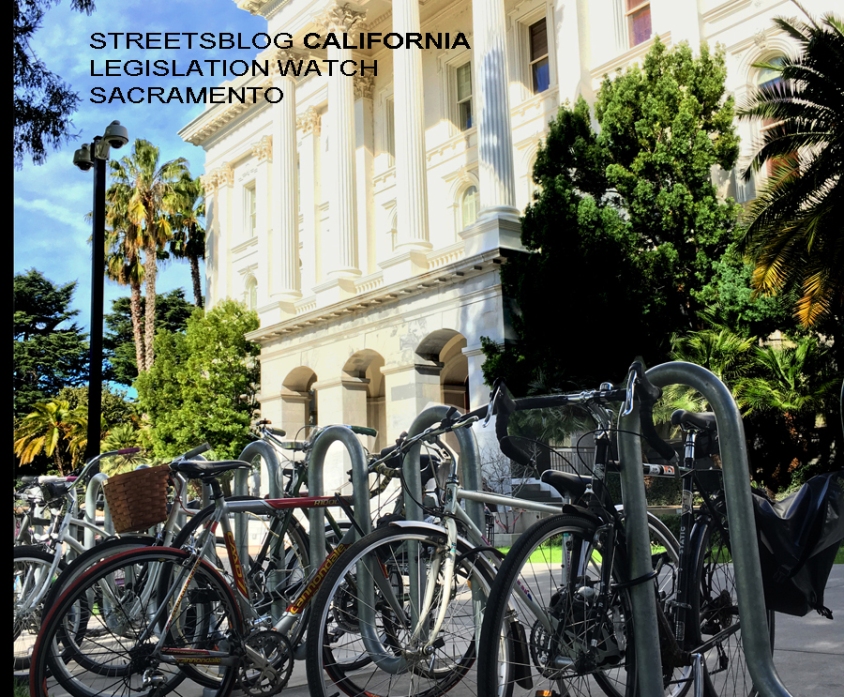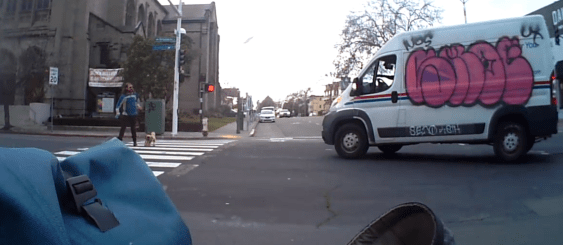Governor Newsom was busy over the weekend, signing around 330 bills and vetoing another 140 of them. There are somewhere around 260 bills left for him to deal with by the October 14 deadline.
Vetoed
Newsom killed several bills important to advocates for sustainable transportation, including A.B. 819, which would have decriminalized transit fare evasion - putting it on a slightly more equal footing with traffic infractions like speeding. His veto message contains this line: "According to one operator, the bulk of the crimes committed in their system are committed by people who have not paid a fare."
He could have instead written (but did not): "According to advocates, the current punishment for fare evasion far exceeds that for less dangerous behaviors, like speeding and blowing stop signs in a car." This bill would have not have been a get-off-free card for fare evaders; not paying would still have been a ticketable offense, but at a far less draconian cost for offenders. It's disheartening that the Governor could only see a risk of "increased crime on transit."
The Governor also killed a bill from the same author, Isaac Bryan, that would have legalized riding on sidewalks where there is no bike lane. A.B. 825 would have recognized that sometimes people face a hard choice between their own safety and the law as it is written.
His veto message says "most sidewalks are not designed for bicyclists to safely use them, and riding on sidewalks would significantly increase the risk of collisions with pedestrians." But it doesn't address the risk to someone on a bike who must ride in fast, heavy traffic except to tout the state's recent investments in bicycle infrastructure - which are nowhere near enough to meet the need for them. And Newsom ignores the original impetus of the bill, which was to address racial discrimination in terms of who is likely to be stopped for riding on a sidewalk in the first place.
Signed
Among the bills Governor Newsom signed are:
Corporate Climate Accountability "Package"
Senator Scott Wiener's Climate Corporate Data Accountability Act, S.B. 253 requires companies of a certain size doing business in California to track and report on all climate emissions from making and selling their products. Newsom's signing message takes credit for this "important policy" as another example of California's climate leadership, but he has concerns: namely the cost to businesses and its "infeasible" deadlines. Those did not stop him from signing it into law, however.
Senator Henry Stern's Climate-Related Financial Risk bill, S.B. 261, requires companies to publicly disclose the financial risks to themselves from climate change. It's something they should be doing for themselves, anyway, and many likely are; but there was intense lobbying against it because making that information public is a step too far for some. Newsom writes that the bill "will encourage [companies] to adopt practices that seek to minimize and avoid [climate] risks." He has the same concerns with this bill as with Senator Wiener's bill - namely costs and timelines - but signed it anyway.
Transparency on Transportation Investments
Newsom also signed Senator Lena Gonzalez's bill to require Caltrans to report data about projects on the state highway system, S.B. 695. This bill is a start towards better transparency in terms of where California is spending its transportation investments.
AB 744 by Assemblymember Juan Carrillo's A.B. 744 was also signed. This bill calls for the California Transportation Commission to "assess the procurement and implementation of data, modeling, and analytic software tools to support the state’s sustainable transportation, congestion management, affordable housing, efficient land use, air quality, economic, and climate change strategies and goals." In other words, to move towards making data about these programs more consistent and accessible.
Newsom also signed Assemblymember Christopher Ward's bill A.B. 251. This calls for the California Transportation Commission to study the relationship between vehicle weight and the safety of bike riders and pedestrians, as well as to wear and tear of roads, and to assess the costs and benefits of a passenger vehicle weight fee.
Safety
Newsom signed A.B. 361 from Assemblymember Christopher Ward, which will allow public jurisdictions to deploy cameras on city-owned vehicles to capture images of cars violating bike lane parking restrictions. Similar to the way buses are now allowed to photograph vehicles violating bus stop parking and bus-only lane restrictions, the intent is to make it easier for cities to enforce these safety violations. It's not clear which jurisdictions are ready to try out this enforcement method.
The bill from Senator Anthony Portantino, S.B. 538, that will require Caltrans to create the position of "Chief Advisor on Bicycling and Active Transportation" within their leadership team was signed by the Governor as well. This is very interesting timing, given the recent firing of a staunch advocate for bicycling and active transportation within Caltran's leadership office. Would a "bike czar" do more than just assist Caltrans with greenwashing its highway investments?
As the California Bicycle Coalition wrote in response to the firing of Deputy Director Jeanie Ward Waller by Caltrans Director Tony Tavares: "As the agency responsible for 50,000 miles of roadways - almost twenty percent of which serve as local streets - Caltrans plays an enormous role in making roads in California safe places for people to bike and walk. The agency is also tasked with moving our transportation network away from car dependency to support the state's climate change goals. But as the recent firing of the person responsible for keeping Caltrans on track with those goals shows, the agency that used to be called the Department of Highways still sees its primary role as increasing California’s highway capacity, working against the transition to a green transportation future."
And, last one for now, more to come in the next few days: Newsom also signed S.B. 434 by Senator Dave Min. This bill calls for transit operators to conduct a survey of their riders "for the purpose of informing efforts to improve the safety of riders and reduce street harassment on public transit." The survey is being developed by Mineta Transportation Institute at San Jose State University.






